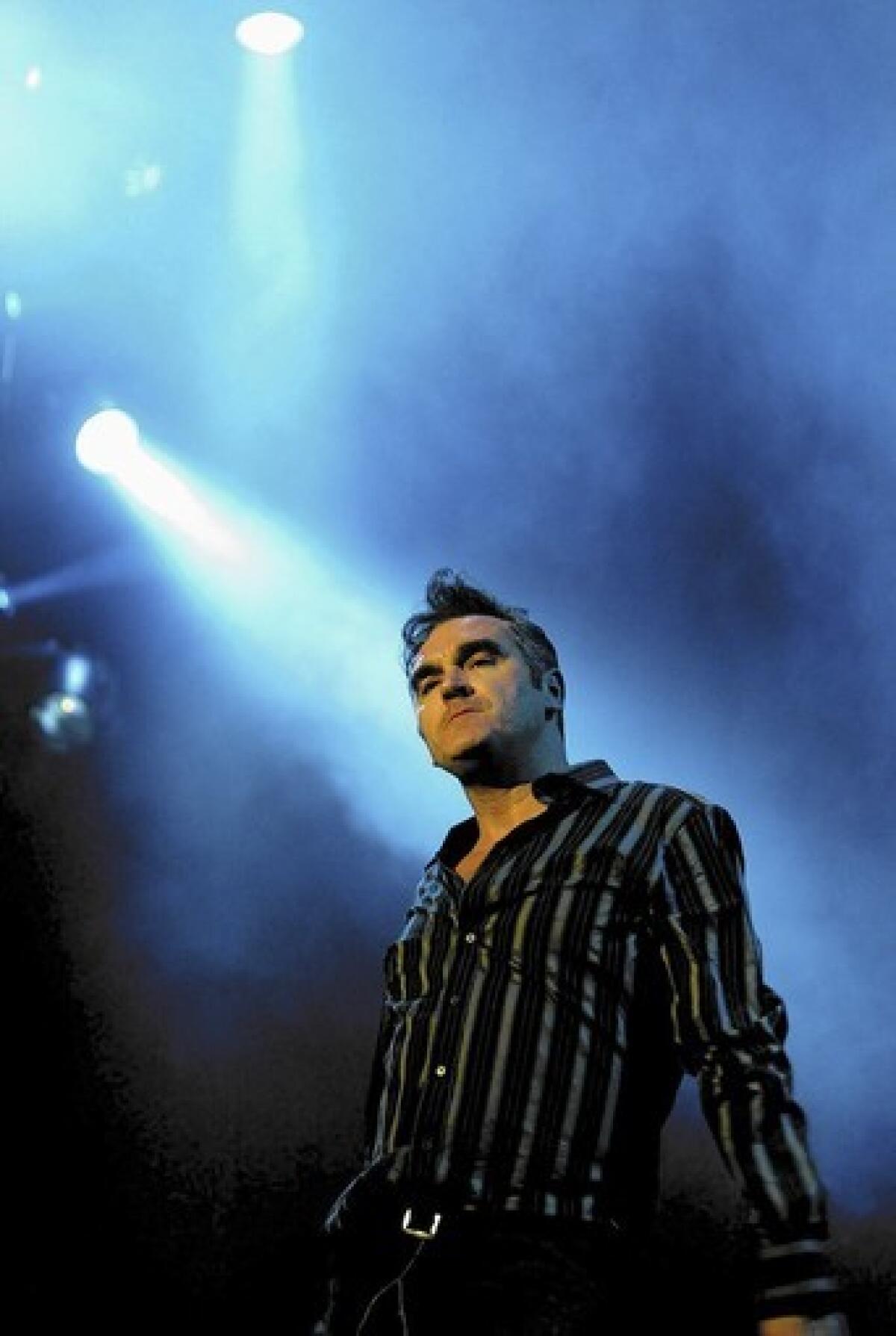Morrissey is the boy with a thorn in his side in ‘Autobiography’

- Share via
So much about Morrissey has hardened into caricature over the course of his three-decade musical career — he’s a megalomaniac! A sad sack! Perhaps even a racist! — that you might expect him to use his feverishly anticipated memoir to dismantle some of those notions.
Maybe next time.
With its desperate hyperbole and withering cruelty, its vivid set pieces and lengthy odes to forgotten movie stars, “Autobiography” is a corroborating portrait of the artist we’re all certain we know, down to its very title, which seems to be after a kind of scholarly weight that something like the folksier “My Life” wouldn’t have conveyed.
In England, where the book became an instant hit when it was released in October, Morrissey reportedly demanded — and received — the distinctive Penguin Classics jacket design ordinarily reserved for the likes of Elizabeth Barrett Browning and the Athenian Constitution. (“You should, after all, judge a book by its cover,” he writes here.) The in-joke of that august presentation, of course, is that Morrissey’s cult celebrity, first as the frontman of the beloved English post-punk band the Smiths and later as a solo act, hardly puts him in the pantheon of Western culture.
Or at least you assume the cover is an in-joke until you get not terribly far into “Autobiography,” at which point it becomes clear — well, clearer — that Steven Patrick Morrissey, now 54, believes deeply in his own importance.
Not his popularity, mind you: At least one-fifth of this chapter-less, nearly 500-page book is devoted to his complaints about being overlooked by tastemakers and gatekeepers — absurd, given that they’re among those who love Morrissey most. Yet in a world drowning in drivel, that only boosts his significance.
“Buying a Morrissey disc,” he claims, “remains a political gesture.”
A gesture of what? Solidarity with the oppressed, for starters. “Autobiography” opens on Morrissey’s miserable childhood in “forgotten Victorian knife-plunging Manchester,” where like Oliver Twist he suffers at the gnarled hands of various schoolteachers seemingly hell-bent on extinguishing his spark.
He discovers music as a way out, only to see it become a road to further conflict — with record executives, with his bandmates, with the idols who invariably disappoint him for failing to uphold the artistic ideals to which he alone clings. It’s a virtual diary of disappointment, this book, as Morrissey recounts his ascent with the Smiths (which was sorely misunderstood), the group’s breakup (which surely could’ve been prevented) and his gradual embrace of the pop star existence he’s lived a portion of in L.A. (where the sunlight amounts to an “inescapable fire that makes me ill after just one week”).
It sounds excruciating — and occasionally it is, as when he spends nearly 50 pages slogging through a mid-’90s court trial in which ex-Smiths drummer Mike Joyce (“a flea in search of a dog,” per Morrissey’s description) sought a greater share of the band’s royalties.
Far more often, though, Morrissey writes with a sense of style, vanishingly rare in rock memoirs, that not only redeems his ceaseless whining but also elevates it to the literary standing he evidently covets.
“Leaving Manchester always meant the train to London — giddy yet sad on a journey all alone,” he writes. “No matter how high-speed the train, the frozen reflection in the window is the collapsed countenance of your own face staring back at you, unchanged with the fast-track passing of miles, questioning, questioning, questioning, like a second you — an inner you, representing the superiority of reason, reminding you that there is nowhere to run.”
I can’t recall another book by a songwriter with as many passages — florid, yes, but often with a biting wit — equal to his or her lyrics. Like its author, the book sings.
And yet it leaves so much unsaid. Though he’s happy to shovel scorn upon virtually everyone in his life and to exercise a sharp critical eye regarding his favorite records (including his own), Morrissey offers little about his personal life, particularly the romances he refers to only glancingly. There’s even less in the American edition of “Autobiography” than in the British; a number of lines about his relationship with a man named Jake have been cut from this version.
Neither does Morrissey take advantage of the opportunity to finally debunk the nagging accusations that he’s a nativist and a misogynist; indeed, he seems to go out of his way to shore up the latter idea, writing meanly of a female critic’s “whale-bearing hips” even as he dismisses her charges against him as unworthy of his attention.
The result is a burnishing of Morrissey’s established image, not a glimpse beneath the surface. It’s yet another performance — a grandly entertaining one — from an artist whose only use for intimacy may be as part of his act.
Autobiography
Morrissey
Putnam: 459 pp., $30
More to Read
Sign up for our Book Club newsletter
Get the latest news, events and more from the Los Angeles Times Book Club, and help us get L.A. reading and talking.
You may occasionally receive promotional content from the Los Angeles Times.








